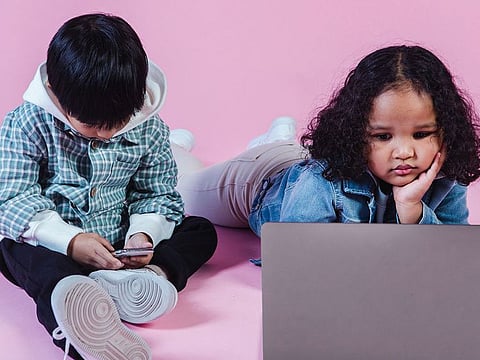COVID-19: Why are UAE mums scared of tablets?
Screen addiction is real and infectious – and it’s the children who are catching it

“He doesn’t know what’s good [and what’s] not [anymore],” says a Lebanese mum-of-three based in Dubai who has requested anonymity. She’s talking about her nine-year-old son who has begun to lash out at his siblings when he doesn’t get his iPad.
“It’s like [dealing] with an alcoholic… you take alcohol away from them, they will be mad and frustrated and won’t know what to do. It’s exactly the same with the iPad,” she says.
For Italian expat Paola Surdo, the shock – and realisation – that her eight year old was too attached to his iPad came when she tried after a long day of engagement to take it away. “He [had] spent literally the whole day that day [with an iPad]. So when I told him come on it’s time to go to bed, it’s very late and I just got it from his hand, he started crying. I got scared,” she recalls.
While the debate of how much screen time is good for a child was always going to spring up, the COVID-19 pandemic acted like a catalyst for the problem – children who often have no choice but to use technology to communicate with friends or stay entertained because of no physical outlet, were bound to get addicted to their screens.
According to US-based Centre for Parenting, kids over the age of eight spend about 44.5 hours each week in front of digital screens. And they want more.
“When they [children] eat they want the iPad in front of them. They [the two older kids] fight for the iPad all the time. The little one, [who is] four, is crying because they are not giving him time, not playing with him. So he also gets addicted to the iPad,” says the Lebanese mum.
Over the years studies have shown that overenthusiasm where screen time is concerned can lead to a number of problems, from cognitive to socialisation issues. Dr Ateeq Qureshi, from the Priory Wellbeing Centre, Dubai, says: “Learning, memory and cognitive abilities can be adversely affected by excessive screen use. There is reduced creativity. Many aspects of screen use and the way digital media is consumed can also lead to increased anxiety and problems with self-esteem. Studies also show an association between increased screen use and Attention Deficit Hyperactivity Disorder (ADHD) symptoms.”
Dr Asmahan Khalil of Open Minds, Psychiatry, Counselling & Neuroscience Centre, adds: “More screen exposure in children under three is associated with irregular nap times and bedtime. Moreover, children with a TV in their bedroom have more sleep disorders (resistance to bedtime, later bedtime and anxiety. They oversleep and less sleep in general). Specifically, blue light exposure prevents the release of melatonin and alters the circadian rhythm. This also Impairs alertness the next day.”
Besides this, we may also be creating a generation of overweight young people. "TV and computers in bedrooms were associated with obesity seeing as children eat and snack more while using a screen device," adds Khalil.
Too much time on the internet can also cause fact and fiction to merge and that line between what’s online and offline to blur, as is in the case of the Lebanese mum. Spending too much time engaging with a virtual world and friends who are present as disembodied voices – like when you play a game and chat over voice calls can lead to a blurring of perception. The real and the fictional combine to form a narrative where emotional quotients may lower and physical pain, especially of others, may not register.
“Parents need to remember to explain the difference between reality and fiction to children, as technology use may lead to blurred boundaries between fact and fiction. Open communication, teaching delayed gratification, boundary-setting and problem-solving are all extremely important in managing children’s technology use,” says Cabrière Jordaan, Counselling Psychologist at German Neuroscience Center.
Sneha John, Clinical Psychologist, Camali Clinic Child & Adult Mental Health, explains how a lack of social interaction may affect a child's emotional quotient."Social interaction includes a combination of verbal and non-verbal body language. Non-verbal cues such as facial expressions, gestures, tone of voice and eye contact serve as markers during communication. The excessive use of screens limit the amount of social interaction in children. Children who use screens would be unable to gauge non-verbal social cues or interpret them aptly in social situations," she says.
It’s all in the head
Getting addicted to something is physical, it’s hormonal. When it comes to social media or gaming, there is instant feedback and instant gratification, which triggers the release of certain chemicals, explains Jordaan.
“Research shows that screen time, and especially mediums that provide instant rewards such as gaming or someone liking our social media posts increase dopamine levels in the brain. Dopamine is a neurotransmitter which plays a role in how we experience pleasure, and it affects mood, movement, impulse control, attention and concentration. As dopamine is related to the rewards-centre of our brains and supports the reinforcement of enjoyable behaviours, it is often involved in addiction,” she says.
Research shows that screen time, and especially mediums that provide instant rewards such as gaming or someone liking our social media posts increase dopamine levels in the brain.

This feel-good sensation can lead to irritability and even anger when it becomes inaccessible. The Lebanese mum of three says she put her fears to the test one day. “One day I said I’ll watch him today, I will not tell him to come eat – I want to see if he’ll act like a human or not, he didn’t feel hungry the whole day. In the evening I got really mad, my heart was really aching. And then there was a fight,” says the mum, sadness lacing her voice.
The easy way
Surdo admits that when the pandemic set in and movement became restricted many found that the easiest thing to do was allow for more screen time. “It’s quite easy to get annoyed so the easiest thing for them and the parents as well was letting them watch their devices,” she says.
Dr Ateeq says he has noticed this tendency too. Some of his young patients admit to playing video games on average for six to seven hours per day. “My biggest worry as the pandemic has progressed is how unrestricted and unfettered screen use is becoming normalised. Screen use has become so prevalent that it is very hard, sometimes impossible for parents to put limits on or monitor usage.”
Questions to consider
Dr Ateeq issues some questions he wants parents to ask themselves including the context and quantity of time a child is spending online. Is the content passive or interactive? High activity video games may show a stronger association with attention and hyperactivity symptoms. And how much of a distraction is this hobby. Fixation on screen time and use is not necessary if a child remains fully engaged with a balanced routine, says Dr Ateeq.
Sometimes however, like in the case of Surdo or the Lebanese mum of three, greater intervention and thought may be required. Perhaps then Surdo’s idea of going cold turkey is best? “Me and my husband, we decided for this summer that the iPad will stay in Dubai. We will finally travel after two years and I really want them to get in touch again with cousins and friends and nature, with parents as well. We decided all devices will stay in Dubai. The first two days [after I told them this] it was like a drama; my son kept on crying, begging us [to rethink]. And I know this is [a] very dramatic, drastic precaution, but I think it’s the only way to manage it,” she says.
Dr Ateeq’s key advice for parents
• Talk to your children (if old enough) about the need for limits and monitoring. Make it a collaboration not a battle. This often involves modelling the behaviour. • For younger children, co-viewing can protect young kids against many downsides of screen time. • Children under two should not have any screen time except short video calls with family and relations. Children under five should have less than an hour of recreational screen time. Interactive content and co-viewing is always advised. • Make family rules. For example, no devices or TV at least an hour before bedtime and create designated media-free places and times (such as dinner time) for all family members, including adults. • Continue to watch what kids watch/play online and talk to them about online bullying, sexting and other hazards. • Talk to them about why there’s no screen time before bed. There should be no screens an hour before bed as this affects sleep quality and duration and means they will lack the deep and REM sleep crucial for processing and storing information into memory.
She has also started to plan for a return to the state of normalcy. “Now, I told [my kid’s] best friend that in September I will put a big [note] on the door and if anyone is coming for a playdate there will be no devices, because when you give them the chance to bring their devices, even if they are all together they are just stuck [on] their iPads. It’s really scary,” she says.
The Lebanese mum is planning something similar – no iPads for some time. She is expecting resistance, but is also hopeful. “I keep talking and talking and talking – maybe one day he’ll listen to me,” she says.








